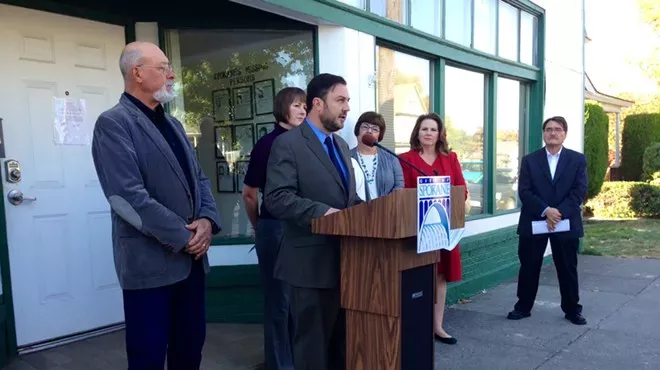Tuesday, October 24, 2017
After yet another bad audit, city of Spokane has fired its accounting director
Last year, when the state auditor's office examined the city of Spokane's finances, it discovered a number of multimillion-dollar mistakes made in 2015.
The Inlander summarized it this way:
While Spokane's accounting department was understaffed, they made several significant spreadsheet errors. Fortunately, the state auditor's office caught it in time, but chided the city for not having proper internal procedures to prevent mistakes. Now, the mistakes have been fixed, the accounting department has been fully staffed, and the city has reformed its system so it doesn't happen again.
Well, it happened again: On Sept. 25, the Washington State Auditor's office released its new audit findings, concluding that Spokane made many of the same errors it made in
"The City continues to make improvements from prior years to ensure accurate
reporting," the auditor wrote. "However, our audit identified internal control weaknesses that adversely affected the City’s ability to produce reliable financial statements. "
Last year, the auditor identified "significant deficiencies" in the city of Spokane's financial reporting, but this year, the auditor's office verdict was even more serious: The city's financial reports suffered from "material weaknesses," highlighting the city's continual struggle to get its accounting practices in proper shape.
Just four days after the audit was officially released, Mayor David Condon sent a letter to Kim Bustos, firing her as the director of the city of Spokane's accounting department.
"I wish you the very best in your future professional endeavors," Condon writes in closing.
Bustos' last day in her role was scheduled to be Oct. 13 — though, depending on civil service rules, she may get a different job with the city.
Tim Dunivant, the city of Spokane's budget director, cautioned against the idea that the firing was directly the result of one audit, but declined to offer other explanations for the termination.
But City Council President Ben Stuckart says that he and the council's budget director, Debra Robole, had recommended that the city make staffing changes as a result of the latest audit.
"They needed a stronger leader," Stuckart says about the accounting department. "There needed to
While Dunivant says Stuckart expressed his feeling that the errors were unacceptable, he says Stuckart never directly recommended staffing changes to him.
"To be frank, when it comes to staffing changes, that's outside of his purview,” Dunivant says.
Robole, meanwhile, acknowledges that in a private meeting with Dunivant, she said the city needed proactive leadership in order to improve future audits — but denied making explicit staffing recommendations.
While the mistakes won't have any direct negative ramifications for the city or its budget — and the problems have been fixed — Stuckart says the issues should have been caught.
"This happened before and it was disturbing," Stuckart says. "It is totally unacceptable. It is totally unacceptable."
The Inlander attempted to reach out to Bustos through email and through the civil service department on Wednesday of last week, but have not heard back. If she does respond, we will update this post.
"Thank you so much for reaching out to me in order to receive my side of the story," she writes. "My resignation was completely unrelated to the recent audit findings, but was due to personal and private experiences that I would prefer to move on from."
Like last year, the audit errors the city made are less dramatic than they might appear at first glance. Mostly, they have to do with errors in procedures, missing information, or putting certain sums in the wrong category in their financial reports.
"The City did not dedicate the necessary time and resources to properly report financial statement balances," the report says.
The auditor's office also identified three instances where the city failed to check whether its subcontractors ran afoul of "federal suspension and debarment requirements" in the grants it has received from the Environmental Protection Agency and the U.S. Department of Transportation. While none of them were found to be ineligible, the auditor faulted the city for not checking.
It's not the first time the city has struggled with its grants procedures. In 2012 and 2013, the state auditor dinged the city's handling of grants in its Community,
Dunivant says he takes the audit findings very seriously.
"We take it seriously enough that we are looking at reorganizing our accounting department," Dunivant says. "We're evaluating, 'Is our accounting department structured appropriately so we have the right levels of 'doers' and 'reviewers?'"
Dunivant says the city is making sure to add multiple levels of review of its financial information at every level. It's changing its paperwork, requiring all subcontractors to show they're federally eligible. He also says he's implementing an internal audit committee, one that will draw from the accounting, finance, and grants management departments, as well as city council.
"It's a culture we need to create," Dunivant says.
He praises how Michelle Hughes, the city's new chief accountant, understands that the audit findings aren't about specific errors, so much as the procedures that led to those errors.
"I think she understands the big picture," Dunivant says.
In the past two years, the audit has identified "turnover in key financial statement preparation positions" as one reason why the city has struggled to produce correct reports. But Dunivant doesn't believe that turnover was to blame for the most recent errors. Instead, it was the lack of an adequate process and safety net to catch some of the mistakes.
In some cases, the standards the city ran afoul of were new, but the city hadn't kept up to date.
Right now, four high-level positions in the accounting department are vacant. Dunivant doesn't see that a problem so much as an opportunity to improve the department. It gives him the flexibility to change the structure. He's already been reaching out to other municipalities for potential accounting talent.
There's another place Dunivant says he'd like to hire new accounting department staff members
Tags: News , city of Spokane , auditor , mistakes , Washington State Auditor's Office , Kim Bustos , accounting director , fired , David Condon , Tim Dunivant , Ben Stuckart , Debra Robole , SuziAnna Scheidegger , Michelle Hughes , Image
























